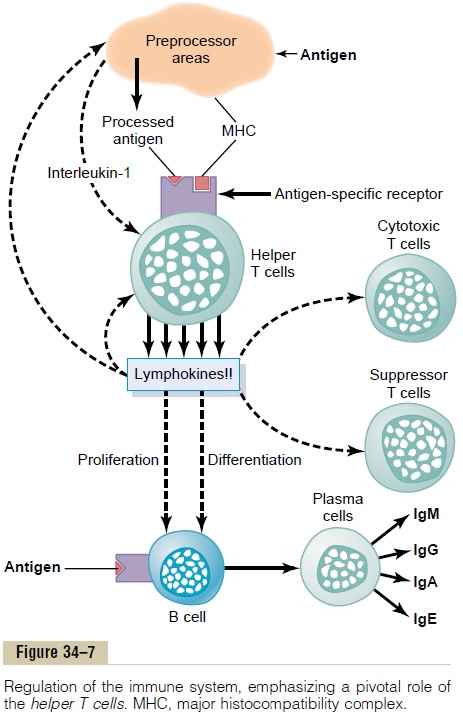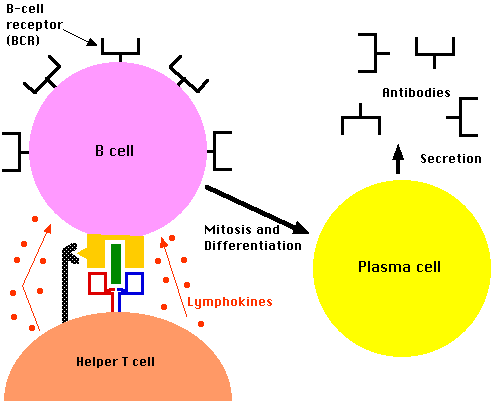These cells secrete lymphokines, such as the interleukins, and other factors which may influence connective tissue metabolism. Other names include lymphokine (cytokines made by lymphocytes), monokine (cytokines made by monocytes), chemokine (cytokines with chemotactic activities), and interleukin (cytokines made by.
Which Of The Following Secrete Lymphokines. Important lymphokines secreted by the t helper cell include: Circulating lymphocytes can detect a very small concentration of lymphokine and then move up the concentration gradient towards where the immune response is required. Which of the following is the correct order of the structure of a lymphatic vessel starting from the lumen. Which of the following t cells destroys pathogens by punching holes in their cell membrane and secreting lymphokines?
 Cellular Sources Of Lymphokines - Sciencedirect From sciencedirect.com
Cellular Sources Of Lymphokines - Sciencedirect From sciencedirect.com
Related Post Cellular Sources Of Lymphokines - Sciencedirect :
They not only help activate b cells to secrete antibodies and macrophages to destroy ingested microbes, but they also help activate cytotoxic t cells to kill infected target cells. Antibodies are modified, at the time of antigen exposure, to specifically react with the. Convert into plasma cells to secrete antibodies. Other names include lymphokine (cytokines made by lymphocytes), monokine (cytokines made by monocytes), chemokine (cytokines with chemotactic activities), and interleukin (cytokines made by.
They not only help activate b cells to secrete antibodies and macrophages to destroy ingested microbes, but they also help activate cytotoxic t cells to kill infected target cells.
Helper t cells are arguably the most important cells in adaptive immunity, as they are required for almost all adaptive immune responses. These are a special group of toxins that activate t cells. These cells secrete lymphokines, such as the interleukins, and other factors which may influence connective tissue metabolism. The lymphatic system consists of all the following except: Following the release of chemokines, local cells are attracted to these proteins and follow their concentration gradient to the source, where the concentration is highest. D) convert into plasma cells to secrete antibodies.
 Source: sciencedirect.com
Source: sciencedirect.com
Which of the following is the correct order of the structure of a lymphatic vessel starting from the lumen. Helper t cells are arguably the most important cells in adaptive immunity, as they are required for almost all adaptive immune responses. Circulating lymphocytes can detect a very small concentration of lymphokine and then move up the concentration gradient towards where the immune response is required.
 Source: slideserve.com
Source: slideserve.com
Test bank questions and answers of chapter 27: Lymphokines aid b cells to produce antibodies. Which of the following is unique to an individual, is present on every cell in that person�s body, and activates t cells?
 Source: researchgate.net
Source: researchgate.net
As dramatically demonstrated in aids patients, without helper t cells we. Antibodies are modified, at the time of antigen exposure, to specifically react with the. Lymphokines aid b cells to produce antibodies.
 Source: sciencedirect.com
Source: sciencedirect.com
Which of the following t cells destroys pathogens by punching holes in their cell membrane and secreting lymphokines? These are a special group of toxins that activate t cells. Question 41 0 / 1 pts which of the following secrete lymphokines?
 Source: sciencedirect.com
Source: sciencedirect.com
They not only help activate b cells to secrete antibodies and macrophages to destroy ingested microbes, but they also help activate cytotoxic t cells to kill infected target cells. They not only help activate b cells to secrete antibodies and macrophages to destroy ingested microbes, but they also help activate cytotoxic t cells to kill infected target cells. B cells producing autoantibodies are eliminated in.
 Source: slideplayer.com
Source: slideplayer.com
As dramatically demonstrated in aids patients, without helper t cells we. Circulating lymphocytes can detect a very small concentration of lymphokine and then move up the concentration gradient towards where the immune response is required. Convert into plasma cells to secrete antibodies.
 Source: slideplayer.com
Source: slideplayer.com
T cells that secrete cytokines that help antibody responses are called _____. Helper t cells are arguably the most important cells in adaptive immunity, as they are required for almost all adaptive immune responses. B cells producing autoantibodies are eliminated in.
 Source: slideplayer.com
Source: slideplayer.com
T cells that secrete cytokines that help antibody responses are called _____. In which nonspecific body defense do blood vessels dilate, bringing more blood to the area, which in turn brings phagocytic wbc to the area to attack the pathogen, protein to replace injured tissues and clotting factors to stop any bleeding? The lymphatic and immune systems
 Source: sciencedirect.com
Source: sciencedirect.com
These are a special group of toxins that activate t cells. In which nonspecific body defense do blood vessels dilate, bringing more blood to the area, which in turn brings phagocytic wbc to the area to attack the pathogen, protein to replace injured tissues and clotting factors to stop any bleeding? Brocklehurst�s textbook of geriatric medicine and gerontology (seventh edition), 2010 related terms:
 Source: slidetodoc.com
Source: slidetodoc.com
As dramatically demonstrated in aids patients, without helper t cells we. Question 41 0 / 1 pts which of the following secrete lymphokines? A) blood b) lymph nodes c) lymphatic vessels.
 Source: researchgate.net
Source: researchgate.net
Test bank questions and answers of chapter 27: Cytokine is a general name; These cells secrete lymphokines, such as the interleukins, and other factors which may influence connective tissue metabolism.
 Source: researchgate.net
Source: researchgate.net
Brocklehurst�s textbook of geriatric medicine and gerontology (seventh edition), 2010 related terms: Which of the following is unique to an individual, is present on every cell in that person�s body, and activates t cells? Lymphokines aid b cells to produce antibodies.
 Source: slideplayer.com
Source: slideplayer.com
Decreased numbers of circulating mast cells. Helper t cells are arguably the most important cells in adaptive immunity, as they are required for almost all adaptive immune responses. A) blood b) lymph nodes c) lymphatic vessels.
 Source: slideplayer.com
Source: slideplayer.com
Decreased conversion of b cells to plasma cells. D) convert into plasma cells to secrete antibodies. Decreased conversion of b cells to plasma cells.
 Source: researchgate.net
Source: researchgate.net
Question 41 0 / 1 pts which of the following secrete lymphokines? Important lymphokines secreted by the t helper cell include: Antibodies are modified, at the time of antigen exposure, to specifically react with the.
 Source: brainkart.com
Source: brainkart.com
Which of the following secrete cytokines? Cytokine is a general name; In which nonspecific body defense do blood vessels dilate, bringing more blood to the area, which in turn brings phagocytic wbc to the area to attack the pathogen, protein to replace injured tissues and clotting factors to stop any bleeding?
 Source: biology-pages.info
Source: biology-pages.info
B cells producing autoantibodies are eliminated in. Brocklehurst�s textbook of geriatric medicine and gerontology (seventh edition), 2010 related terms: The lymphatic and immune systems
 Source: slidetodoc.com
Source: slidetodoc.com
A) blood b) lymph nodes c) lymphatic vessels. The _____ mainly target cancer cells. Cytokines are small secreted proteins released by cells have a specific effect on the interactions and communications between cells.
 Source: semanticscholar.org
Source: semanticscholar.org
Which of the following is unique to an individual, is present on every cell in that person�s body, and activates t cells? D) convert into plasma cells to secrete antibodies. Decreased conversion of b cells to plasma cells.

Cytokine is a general name; Other names include lymphokine (cytokines made by lymphocytes), monokine (cytokines made by monocytes), chemokine (cytokines with chemotactic activities), and interleukin (cytokines made by. Which of the following t cells destroys pathogens by punching holes in their cell membrane and secreting lymphokines?
Also Read :





